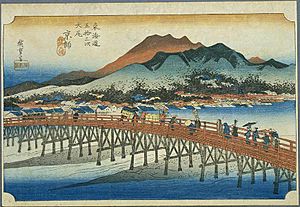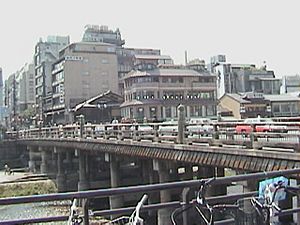Sanjō Ōhashi Bridge facts for kids
Sanjō Ōhashi Bridge (三条大橋) is a famous bridge in Kyoto, Japan. It crosses the Kamo River, connecting different parts of the city. This bridge is part of Sanjō-dōri, which means "Third Avenue." It's a very important landmark in Kyoto.

The Bridge's Story
The Sanjō Ōhashi Bridge has a long and interesting history. During the Edo period (1603-1868), this bridge was super important. It marked the very end of the Tōkaidō road. The Tōkaidō was a major highway that connected Edo (which is now Tokyo) with Kyoto. Imagine it as one of the main roads for travel and trade in old Japan!
The bridge you see today is made of concrete. It was built in 1950. This modern bridge stands strong where many older versions once stood, continuing its role as a vital crossing point.
More About the Tōkaidō Road
The Tōkaidō road was not just a path; it was a journey through many different places. Along this road, there were 53 special stops or "stations." These stations offered travelers places to rest, eat, and stay overnight. They were like rest stops on a long highway trip.
Many artists created beautiful artworks showing these stations. One of the most famous is a series of woodblock prints called The Fifty-three Stations of the Tōkaidō. These prints show what life was like along the road. They also show the amazing landscapes of Japan during that time. The Sanjō Ōhashi Bridge was the final stop on this famous journey.
 | Bayard Rustin |
 | Jeannette Carter |
 | Jeremiah A. Brown |


